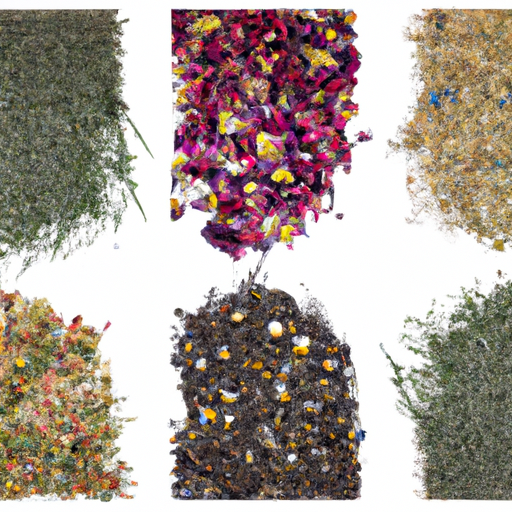Picture yourself embarking on a quest to discover the ideal cup of tea, one that will calm your mind and unwind your body. While exploring the wide array of herbal teas, you stumble upon a warning story – a story of two potent forces that should never be combined.
Just like oil and water, there are certain herbal teas that are not suitable for those taking selective serotonin reuptake inhibitors (SSRIs). These medications, commonly prescribed for depression and anxiety, can interact with specific herbal teas, leading to potentially dangerous consequences.
In this article, I will guide you through the treacherous terrain of herbal teas, highlighting those that should be avoided if you are on SSRIs. From the enchanting St. John’s Wort Tea to the captivating Kava Tea, we will explore the herbal teas that may pose risks when combined with SSRIs.
So, sit back, relax, and let’s embark on this herbal tea adventure together, ensuring your safety and well-being along the way.
Key Takeaways
- St. John’s Wort tea can cause serotonin syndrome when taken with SSRIs.
- Kava tea may cause liver damage when taken with SSRIs.
- Passionflower tea can cause side effects like drowsiness and increased bleeding risk when taken with SSRIs.
- Valerian root tea can cause side effects like drowsiness and stomach problems when taken with SSRIs.
St. John’s Wort Tea
Did you know that if you’re taking SSRIs, St. John’s Wort tea may not be suitable for you? St. John’s Wort is a popular herbal remedy known for its potential mood-enhancing properties. However, it contains compounds that can interact with certain medications, including SSRIs.
Studies have shown that combining St. John’s Wort with SSRIs can lead to a condition known as serotonin syndrome, which can cause symptoms such as agitation, confusion, rapid heart rate, and high blood pressure. It is important to note that not everyone who takes SSRIs will experience these side effects, but it is still recommended to avoid St. John’s Wort tea if you are taking SSRIs.
If you are interested in trying herbal teas, it’s best to consult with your healthcare provider for personalized recommendations and dosage guidelines.
Speaking of other herbal teas, let’s now discuss kava tea and its potential interactions with SSRIs.
Kava Tea
Avoid drinking kava if you’re on SSRIs, as it may not be the best choice for you. Kava tea is made from the roots of the kava plant and has been consumed for centuries in the South Pacific for its relaxing effects. However, it has been associated with potential side effects and controversy.
Some studies have suggested a possible link between kava tea consumption and liver damage, although the exact mechanisms are still unclear. Due to this concern, many health authorities have issued warnings and advisories about its use. It is important to note that the risk of liver damage may be higher for individuals with pre-existing liver conditions, or when kava is consumed in excessive amounts or for extended periods.
Transitioning to the next subtopic, passionflower tea is another herbal tea that may have potential benefits for those seeking relaxation.
Passionflower Tea
If you’re in the mood for a relaxing beverage, why not try a cup of passionflower tea? Passionflower has been used for centuries as a natural remedy for anxiety and insomnia. It contains compounds that may help promote relaxation and improve sleep quality.
However, it’s important to note that passionflower tea may interact with certain medications, including SSRIs. While research is limited, there have been reports of potential side effects such as drowsiness, dizziness, and an increased risk of bleeding when combined with SSRIs.
Therefore, if you’re currently taking SSRIs, it’s best to consult with your healthcare provider before incorporating passionflower tea into your routine. They can provide guidance on whether passionflower tea is a suitable option for you or recommend alternative natural remedies, such as valerian root tea, that may have fewer interactions.
Valerian Root Tea
When you’re in need of a calming and soothing beverage, why not try a cup of valerian root tea? Valerian root has been used for centuries to promote relaxation and sleep. It is known for its sedative properties and is often used as a natural remedy for insomnia and anxiety. Valerian root tea has several benefits, including reducing the time it takes to fall asleep and improving sleep quality. However, it is important to note that valerian root tea may interact with certain medications, including SSRIs. It is always best to consult with your healthcare provider before adding any herbal tea to your routine, especially if you are taking medication. Valerian root tea may have side effects such as drowsiness, dizziness, and stomach problems. Now, let’s move on to the next topic and explore the benefits of chamomile tea.
Chamomile Tea
Try a cup of chamomile tea to experience its calming and soothing effects on your mind and body. Chamomile tea has been used for centuries as a natural remedy for relaxation and sleep. It contains compounds like apigenin, which bind to certain receptors in the brain, promoting relaxation and reducing anxiety.
Additionally, chamomile tea has been found to improve sleep quality, making it a great option for those struggling with insomnia. To prepare chamomile tea, simply steep a chamomile tea bag or dried chamomile flowers in hot water for about 5 minutes. You can also add a touch of honey or lemon to enhance the flavor.
Whether you prefer it hot or iced, chamomile tea is a delicious and beneficial beverage that can help you unwind and find tranquility.
Now, let’s move on to the next topic of discussion: ginseng tea.
Ginseng Tea
Ginseng tea is a subtopic that raises concerns about its potential impact on antidepressant effectiveness and the increased risk of mania in individuals with bipolar disorder.
It’s important to note that ginseng has been found to possibly decrease the effectiveness of antidepressant medications, which can have detrimental effects on those relying on these medications for their mental health.
Additionally, individuals with bipolar disorder should exercise caution when consuming ginseng tea, as it may increase the risk of manic episodes.
Possible Decrease in Antidepressant Effectiveness
Avoid any herbal tea that may potentially decrease the effectiveness of your antidepressant medication. It’s important to be aware of possible interactions with other medications, as well as the potential side effects of herbal teas on mental health.
Some herbal teas, such as ginseng tea, have been found to have components that can interfere with the absorption or metabolism of antidepressant medication, leading to a decrease in its effectiveness. This can be problematic for individuals who rely on these medications to manage their mental health conditions.
In addition, certain herbal teas may have their own side effects on mental health, such as increased anxiety or agitation. It’s crucial to consult with a healthcare professional before incorporating any herbal teas into your routine to ensure they don’t interfere with your antidepressant medication or worsen your mental health symptoms.
Moving forward, let’s discuss the increased risk of mania in bipolar disorder.
Increased Risk of Mania in Bipolar Disorder
It’s important to note that while herbal teas can have many health benefits, certain ones may not be suitable for individuals taking SSRIs. In addition to the possible decrease in antidepressant effectiveness, there’s also evidence to suggest an increased risk of mania in individuals with bipolar disorder.
Bipolar disorder is a complex mental health condition characterized by periods of mania and depression. Research has shown that some herbal teas, particularly those containing stimulating ingredients like ginseng or St. John’s wort, may exacerbate manic symptoms in individuals with bipolar disorder. This highlights the importance of consulting with a healthcare professional before incorporating herbal teas into your routine, especially if you have a history of bipolar disorder.
Moving forward, let’s now delve into the potential effects of licorice root tea on individuals taking SSRIs.
Licorice Root Tea
Indulging in Licorice Root Tea can seriously undermine the effectiveness of your SSRI medication, leaving you feeling frustrated and defeated. Licorice root contains a compound called glycyrrhizin, which can interfere with the way your body metabolizes certain medications, including SSRIs. This can result in higher levels of the medication in your system, leading to potential side effects or reduced efficacy.
If you’re looking for alternative herbal teas to help with anxiety while taking an SSRI, there are several options available. Chamomile tea is known for its calming properties and is generally safe to consume alongside SSRIs. Lemon balm tea can also be beneficial, as it has been shown to reduce anxiety symptoms.
However, it’s important to always consult with your healthcare provider before incorporating any new herbal teas into your routine, especially if you’re taking medication.
Frequently Asked Questions
Can I consume St. John’s Wort tea while taking SSRI medication?
I wouldn’t recommend consuming St. John’s wort tea while taking SSRI medication. While St. John’s wort is sometimes used as an alternative treatment for depression, it can interact with SSRIs and cause potentially dangerous side effects. It’s best to consult with a healthcare professional.
Is it safe to drink Kava tea if I am currently on an SSRI?
Drinking kava tea while on an SSRI can be risky due to potential interactions. However, discussing safety concerns and exploring alternatives like kava tea as a natural anxiety management option may be valuable.
Can Passionflower tea interact negatively with SSRI medication?
Potential risks of consuming passionflower tea while on SSRI medication include the possibility of negative interactions. It is important to be cautious and consult with a healthcare professional before combining herbal teas with SSRI medication.
Is it advisable to consume Valerian Root tea while on SSRI medication?
While valerian root tea may have potential benefits for sleep and anxiety, it is important to note that there can be potential risks when combining it with SSRI medication. Additionally, chamomile tea may also pose risks.
Are there any potential risks or interactions between Chamomile tea and SSRI medication?
There are potential risks and interactions between chamomile tea and SSRI medication. It is advisable to avoid chamomile tea while on SSRI medication as it may increase the risk of side effects.
Conclusion
In conclusion, it’s important to be aware of the herbal teas that may not be suitable for those taking SSRIs. St. John’s Wort tea, known for its mood-enhancing properties, should be avoided as it may interact with SSRIs and lead to adverse effects.
Similarly, Kava tea, Passionflower tea, Valerian Root tea, and Ginseng tea can also potentially interact with SSRIs.
On the other hand, Chamomile tea and Licorice Root tea are generally considered safe to consume while taking SSRIs.
It’s always recommended to consult with a healthcare professional before consuming herbal teas to ensure your safety and well-being.










